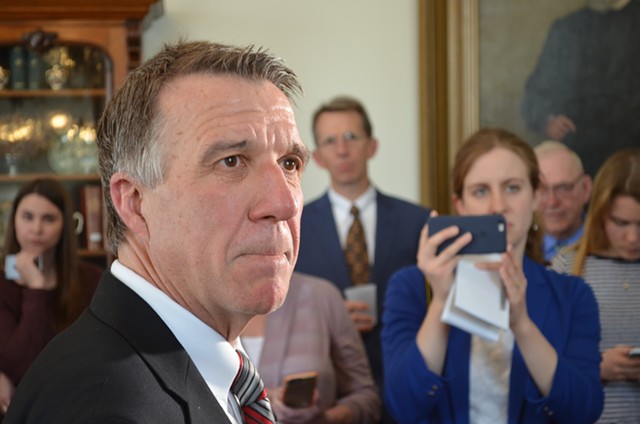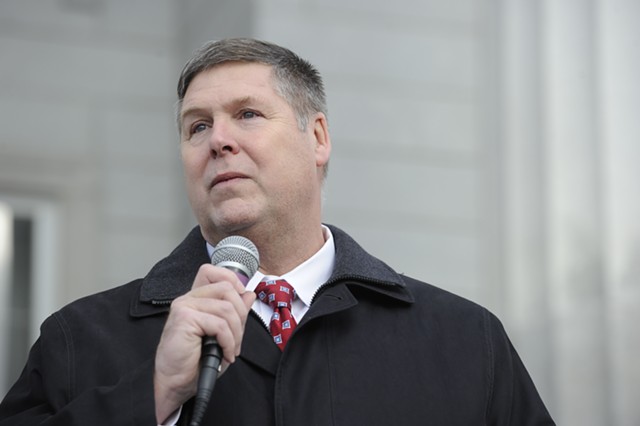
- File: Alicia Freese
- Gov. Phil Scott
Months before Gov. Phil Scott's administration proposed partnering with a private prison corporation
to build a 925-bed facility in northwestern Vermont, the governor and two cabinet officials met with industry lobbyists who could benefit from the plan.
Records obtained by
Seven Days show that Scott met with representatives of CoreCivic, formerly known as Corrections Corporation of America, during a February 2017 trip to Washington, D.C. According to Scott spokesperson Rebecca Kelley, the 15-minute meeting included CoreCivic's Ohio-based lobbyist, Dan Kaman, and the company's Vermont lobbyist, Andrew MacLean.
"I don't recall that there was any ask," the governor said. "They just wanted to say hello and wanted to have a chance to meet and congratulate me on the election."
Several months later, in July 2017, MacLean emailed the Vermont Department of Corrections to request a meeting with Commissioner Lisa Menard, according to separate records obtained by
Seven Days. He wrote that CoreCivic had been "discussing different methods for financing the construction of human services infrastructure in Vermont." MacLean, who works for the Montpelier firm MMR, wrote that he had already spoken about the issue with Menard's boss, Secretary of Human Services Al Gobeille.
"As a result of that recent conversation with [Secretary] Gobeille, it was suggested that a meeting might be an efficient way for us to present ideas and thoughts about the best ways [for] the state to develop buildings and facilities to meet its needs," MacLean wrote.
The request led to a September meeting in Waterbury that, according to the records, included Gobeille, Menard, MacLean, Kaman and two Tennessee-based CoreCivic executives, John Malloy and Tony Grande.
"CoreCivic is always interested in exploring ways we can provide solutions to the challenges states are facing, and we seek to maintain an ongoing dialogue with potential government partners to support that effort," the company's spokesman, Jonathan Burns, said in a written statement. "Our recent meetings with Vermont officials have been brief introductory visits."

- File: Jeb Wallace-Brodeur
- Secretary of Human Services Al Gobeille
Last week, Gobeille sent the legislature
a report outlining a "10-year vision" to build a new facility in Franklin County that would house hundreds of prisoners and mental health patients. The report pegged the price of such a complex at $141 to $165 million and suggested that the "most affordable model" would involve contracting with a private prison firm to build it and lease it back to the state.
"There are entities, both local building firms and national private prison corporations, who have approached the State in recent years and expressed an interest in working toward this end," the report's authors wrote.
According to Gobeille, the September event was just "a meet-and-greet" and did not include specific discussion of a prison-building partnership. He noted that his agency's report had documented the private-sector interest.
"So we were very transparent that there's been people lobbying," Gobeille said. "But the way state contracting works, we can't talk about anything we're going to contract for ahead of time, so we did not talk with them about that."
Scott's discussion with CoreCivic lobbyists came during conferences hosted by the National Governors Association and the Republican Governors Association. Records show that his schedule also included a 15-minute meeting with Reynolds American, the nation's second-largest tobacco company.
The governor said he did not know why or how the cigarette purveyor landed on his schedule.
"I was wondering why it was that I was meeting with them, but, again, it was just a congratulatory [meeting]," he said. "There was no ask."
"Maybe they got the wrong Scott," he joked, referring to Florida Gov. Rick Scott. "Who knows?"
During the Vermont governor's 2016 campaign,
CoreCivic gave him $1,000, while Reynolds American contributed $4,000.
Both companies have been major donors to the RGA, which
spent more than $3 million on advertisements supporting Scott's candidacy. According to the Center for Responsive Politics, CoreCivic
donated at least $565,000 and Reynolds American
at least $680,000 to the RGA during the 2016 election cycle.
"CoreCivic supports individuals and organizations of any political affiliation that are open to learning more about the value of public-private partnership solutions," said Burns, the CoreCivic spokesman.
Scott said he had no qualms about taking money from either corporation, arguing that if he were to "start stipulating which ones" to accept contributions from, it would "appear that you're doing it for a reason." He said he was unconcerned that such companies might be seeking influence with him.
"No, because that doesn't buy anything from my perspective — other than a cordial introduction and 'Hello, how are you?'" he said. "But, again, there's been no ask from any of these entities."
Taylor Dobbs contributed reporting.

















Comments (7)
Showing 1-7 of 7
Comments are closed.
From 2014-2020, Seven Days allowed readers to comment on all stories posted on our website. While we've appreciated the suggestions and insights, right now Seven Days is prioritizing our core mission — producing high-quality, responsible local journalism — over moderating online debates between readers.
To criticize, correct or praise our reporting, please send us a letter to the editor or send us a tip. We’ll check it out and report the results.
Online comments may return when we have better tech tools for managing them. Thanks for reading.